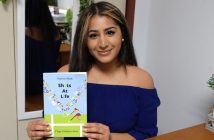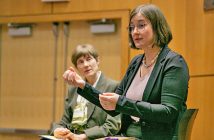Mustafa Kilicarslan had never set foot in New York City before he moved here to attend classes at the Rose Hill campus in the fall of 2015.
But he always knew he wanted to leave his native Turkey to study here, and Fordham’s Bronx campus had a special appeal to him: Gültepe, the area of Istanbul where he lived, translates as “Rose Hill” in English.
He said the United States’ traditions of freedom of religion, inquiry, and speech were things that drew him here.
“In Turkey we are so divided politically, there is no space for talking freely,” he said.
After dabbling in courses in sociology, anthropology, archeology, and history, Kilicarslan, who is Muslim, is leaning toward a Middle East studies major. He’s already declared a minor in Jewish Studies, the first student at Fordham to do so.
Kilicarslan developed a particular interest in Judaism after having taken two courses: Jews in the Ancient and Medieval World, and History of Modern Judaism. He’s enrolled this semester in East European Jewish History, and last month he became Fordham’s first intern in the Museum for Jewish Heritage’s interfaith program.
As part of the internship, he helps facilitate dialogue between Muslim and Jewish elementary school students.
“In Turkey, I didn’t have a chance to study or even read about Jews and Christians. I had only some illusions about them, and some superficial knowledge. My goal here is to really understand these different cultures,” he said.
Magda Teter, Ph.D., the Shvidler Chair in Judaic Studies and professor of history, called Kilicarslan “one of the most exciting and intellectually promising students” that she has met in 15 years of teaching. She’s added new images, maps, and study quotes to her courses in Jewish history course as a result of his queries.
“Since he’s coming from the Muslim tradition, in which the Qur’an was transmitted in Arabic— and not in different versions and translations as biblical texts were—he’s asked very poignant questions about the process of establishing scriptural canon, and about its fluidity,” she said.
“Some of his most thought provoking questions have led me to change the direction and focus of the course I’d taught for over a decade.”
Kilicarslan said one benefit of learning about Christianity and Judaism is that it helps him better understand his own faith. The Qur’an references Jews and Christians, he said, and he sees no reason why they can’t all live together peacefully. The conflicts and persecutions among members of the three faiths has tended to be the result of economics, or political interests or aspirations.
“I’m interested in the complex situations among different groups, and in finding solutions for these situations. What I see is that, like me, a lot of people have [to overcome]a superficial understanding of others.”
“When people of different faiths focus on our common ground and wisdom, such as accepting the same God, seeing violence as unfruitful, and the existence of compassion and love in all three traditions, our tensions will decrease,” he said.



